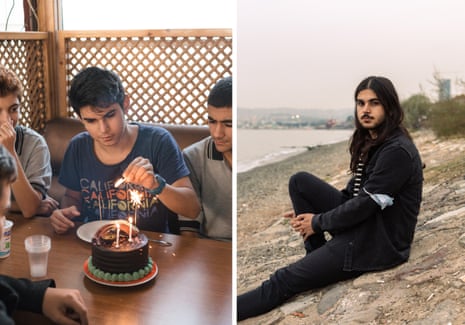‘The older I get, the more I see how politics affects everything’: Halil Erdem, Izmir, Turkey
Four years ago, Halil felt optimistic for the future. Keen on basketball, chess and football, as well as video games, he was unsure what he was going to study at university.
For my birthday this year, my friends surprised me. They all came over to my family house, and we had cake and then went to one of their houses for a sleepover. They got me a French press coffee maker, and I received about 1,500 lira (£150) from my family. I’m going to save it.
It’s a bit weird and frustrating to turn 20 at home: I was supposed to start university this year in Ankara. Instead, because of the pandemic, I’m still in Izmir. The earthquake we had a few weeks ago was really scary. I was on the balcony, and our house shook a lot. But we are lucky; we were OK. A couple of neighbourhoods were very badly affected.

I really love my city: we have everything here. I love spending time outdoors near the sea, and enjoying the sun. But I worked really hard to get into one of the best universities in Turkey. In fact, I spent last year resitting my final exams to get better grades to make that happen. My family are very proud: neither of my parents went to university, but my older brother and I have. All my classes are online for now. I’m doing a preparatory year learning English, and I’ll move to Ankara and start my economics degree in 2021. My spare time is mainly spent watching movies and gaming. Lots of my friends have girlfriends, but I don’t like anyone. I’m not that bothered and neither are my parents, so there’s no pressure.
I got to vote for the first time last year, in the local elections. When I was younger, I never really cared about politics. But the older I get, the more I see how it affects everything. The earthquake response, how the pandemic is managed, the way the value of the currency keeps dropping: all those things have made me realise that politics is how the world works.
After I graduate, I’d like to have a good job that lets me travel. Maybe I will even live abroad. I’m worried about having enough money. After university, I’ll do my military service, and then my goal is to do a big tour of Spain and Portugal.
Interview by Bethan McKernan
‘I’m a white ally of the Black Lives Matter movement. My dad believes it’s a terrorist organisation’: Delia Curtis, Indianapolis, Indiana, US
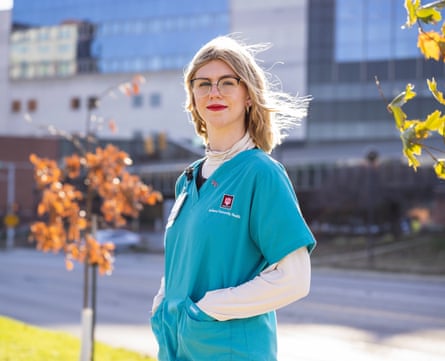
In 2016, Curtis was a high school student in Highland, Indiana, working part-time at a pizza restaurant and relying on her dad for rides. Her dream was to save up for a car, go to university to study something medical, and having never been farther than Chicago, to travel.
Last year, I left home and moved two hours away to college in Indianapolis, to study biology. I’ve got my own car now, which is like my baby. College was going well, but then during spring break, on a trip home for my dad’s birthday, I was told that due to the coronavirus pandemic I couldn’t return to campus until September.
Quarantine changed me. I was back in my childhood bedroom, and it felt like the whole world stopped. But I was able to open up my mind. We faced so many things that were detrimental to this country: it made me realise we don’t have all the time in the world. I came out of those six months a stronger person, better able to make decisions for myself.
During quarantine, everyone in my family, except my dad, who’s an avid Trump supporter, wore a mask outside. We’ve always been very close, but this year it has been difficult to respect him. I’m a white ally of the Black Lives Matter movement, but my dad believes it’s a terrorist organisation. We argue a lot. He ends every conversation with, “I still love you,” and I still love him, but we don’t talk as much as we used to.
Being able to vote in the presidential election this year made me feel powerful. I waited in line for two and a half hours. I’m happy that Trump will no longer be in office and, while I’m not super-excited about Joe Biden, someone who listens to the people is a great step forward. I want to hold him and Kamala Harris accountable.

I moved back to Indianapolis in September and am living off-campus in an apartment with two friends. My family didn’t want me to – they were nervous that I wouldn’t be able to take care of myself, which wasn’t very motivating. But I think I’ve matured. I’ve reduced my study hours and started a night job in patient care at the university hospital. I take vitals and do things like help people go to the bathroom. I enjoy feeling I’m making a difference to people who are coming out of surgery by trying to listen to them. We have Covid-positive patients on our floor, but I haven’t been in contact with them, and we take good precautions. I’m considering not returning to college next semester; since everything went online, not seeing my professors and not being hands-on in labs makes learning difficult. And it’s just so expensive that I’m not sure it’s worthwhile. I have no idea what I want to pursue as a career, which feels overwhelming.
I don’t think I’ve cried and laughed and felt scared as much as I have in 2020. My dream now is to save enough money to get a van and live on the road. I’ve heard about different jobs that you can do online. I also have a dream of leaving this country. For a long time I’ve felt my life was about being what other people wanted me to be. Now I’m excited to just live.
Interview by Candice Pires
‘I am trying to earn enough to pay a smuggler to get my family to Turkey’: Mohammed Omran Injeela, al-Bab, Syria

In 2016, Mohammed was living under siege in Douma, near Damascus. He was hopeful that the war would soon end, and that he could finish his studies and one day own a desserts business.
My family and I celebrated my birthday this year the same way we always do: with cake, popcorn and juice. We haven’t been able to give each other presents since before the war, but the quality of the food is much better than it was on my 16th birthday, when we were still living under siege.
I was 10 when Syria’s war started in 2011, and I spent my teenage years at home in Douma, which was held by the opposition for a long time. I was preparing for my last year of school when the bombing escalated. We had to stay underground for months before we went to northern Syria, where people fleeing the regime had to go.
The day we left is still a very clear memory. It took two days to get out, staying first in a displacement camp in Azaz, and then moving to al-Bab, where we had to start all over again. Here, there are suicide bombs sometimes, but it’s nowhere near as bad as Douma. You get used to it. In Douma, our whole life was spent in basements, hiding from Bashar al-Assad’s airstrikes.

I feel as though I lost everything when we had to leave home: my school, my friends. I lost my future. I really wanted to go to university, but I have to work to support my family. I work at a shop selling Middle Eastern sweets, such as künefe and maamoul, as well as croissants and petits fours. The work is hard: the day begins at 2am to start baking, and I usually get to go home by midday. My day off is Friday, which is spent resting or with my family. The only entertainment I have is playing games on my phone, like Pubg.
When I was still in Douma, I wanted to study economics and maybe go into the sweets or desserts business. But all I can focus on at the moment is trying to earn enough to pay a smuggler to get me and my family over the border to Turkey. We are seven people, so it will cost about $10,000 (£7,500). It will take years to save that amount, and crossing the border is very dangerous; but I don’t feel there is any other choice. The situation is only getting worse, and although coronavirus has not affected sales at the bakery too much, cases are rising and most people do not wear masks or use sanitiser.
Four years ago, I was hopeful the war would end soon. Maybe I was naive then, but my feelings about the revolution have not changed. I could never accept Assad as president: he has killed too many people. And I would never serve in his army, which is what happens to guys my age when the regime retakes opposition areas.
Two of my siblings are married now, with children of their own. Maybe one day I will want a family, but I can’t think about that now. Perhaps after I get to Turkey, I will go on to Europe and be a businessman or an entrepreneur there. It’s too late to have a future in Syria.
Interview by Bethan McKernan
‘It’s true what they say about Gen Z not going in for sex and booze as much’: Maria Louise Hecky-Andersen, Haderslev, Denmark
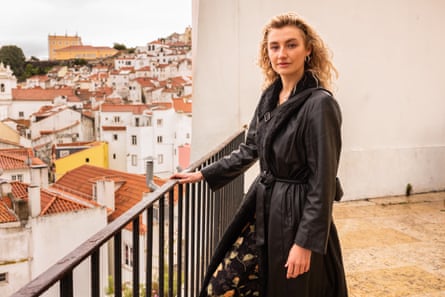
In 2016, Maria celebrated her 16th birthday by drinking 16 shots with her friends, as is the tradition in Denmark, and was given an iPhone. She said she was a ‘pretty happy Dane’, excited about what the future held.
I’m actually in Portugal right now, as there was no work in Denmark. When lockdown hit Denmark in March, I was working for a promotions agency, helping to organise anything from car shows to cheese and wine samples in supermarkets. But with Covid-19, that work just stopped. I don’t have business training – just a “youth education” as we call it in Denmark – so people like me don’t actually know much more than a 16-year-old, who can be employed for half the price.
I finally found a job in Lisbon, manning the phones on the customer helpdesk for UPS, and planned to be here with friends for a year. But the other girls were nervous about getting stuck overseas, so I came alone for a shorter contract. I’m currently living in a flatshare with another Danish girl and a man from Ecuador, who also came for work. It’s OK – one thing about coronavirus is that you bond pretty quickly with the people you’re stuck with.

I’m still pretty much the same person I was at 16, although I don’t drink so much. Back then, as well as cake and cards, the birthday table was laid with a sick bag – for the 16 shots of spirits. But it’s not like that these days. It’s true what they say about Gen Z not going in for sex and booze as much – though it means that the ones who do, really stand out. There’s a stigma.
I thought I wanted to work in politics for a while, but now it’s a mess. Less so in Denmark than elsewhere, but still, politics feels divided: “us and them”. It’s as though “the Trump effect” spread through Europe.
I still don’t know anyone who’s been ill, but of course I’m careful and wear a mask when I need to. It’s how it should be: it’s samfundssind, the Danish term for a sense of collective responsibility.
Am I optimistic about the future? I can go both ways. While I’m afraid for the future of the planet, I’m not afraid for myself: I have a good family, good friends and I’m Danish. So I’m probably safe. But I know that not everyone is so lucky.
Interview by Helen Russell
‘I want to work hard so that I live a different future’: Nickson Avaye, Kampala, Uganda
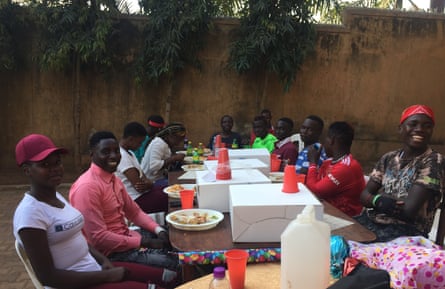
Four years ago, Nickson celebrated his birthday for the first time. Having grown up in rural Kenya, he was living with his sister, her friend, and seven orphans supported by Fund A Future Uganda. He had just got a sponsor for his education, and hoped to be an engineer or a pilot.
I am busy working hard for my A-levels. It has been a strange year, but I’m glad I am finally back at school. Now I want to reach my goal of getting top marks. I am studying maths, economics and physics at Naalya Bweyogerere secondary school, which is less than 10 miles from Kampala. I live in Kira, which is also near Kampala, but in the longer holidays I go home to my parents, in a rural area near Eldoret in Kenya.
In Uganda, schools closed in March, when we were only one month into our first term. We stayed at home until mid-October. I was living with other children – 16 of us altogether. There was a total lockdown and we were not allowed to leave the house for around three months. There were arguments and frustrations, but mostly I was worried about having to repeat my school year.

When it comes to relaxing, I spend a lot of time chatting to friends on social media. I like playing football, and this year I tried to learn how to do backflips. I also like following world news.
It is strange to look back at the photo from my 16th birthday; I look so young. Since then, I have learned a lot about people and how to handle different situations. I feel like now, I am a man. My dream is to go to university – I wish I could get a scholarship to study abroad. I want to work hard so that I live a different future, and I can help my parents and family.
‘During lockdown, I turned Mum’s dining room into my performance studio’: Caitlin Phippen from Swansea, now living in Epsom, Surrey
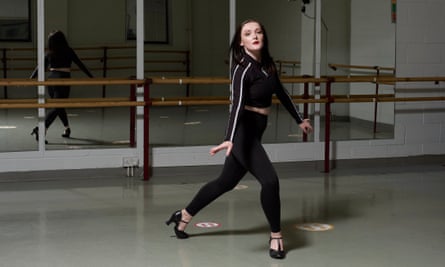
In 2016, Caitlin celebrated her birthday with a sleepover with 16 friends. She wanted to vote, and was nervous about the aftermath of the EU referendum. Anxious about her GCSEs, she dreamed of becoming an actor or a human rights lawyer.
Growing up, it was just me and Mum in a tiny house, but I wouldn’t have had it any other way. She’s my hero – one of those people who will give you everything even if she’s got nothing. Now she’s raising my younger brother and sister alone, and finances haven’t always been easy.
It’s always been my dream to work in musical theatre. After college, I applied for a drama scholarship at Laine Theatre Arts college in Surrey, as I couldn’t afford the fees. One day, just before I was about to go on stage in Bridgend, they rang and told me I’d got it. I cried for days – it meant the world.
My little home town near Swansea is only busy during football matches, but Epsom is busy all the time. Back in Wales, I could walk past anyone and just have a 20-minute conversation, whereas here, if I go up to someone and say, “I really like your outfit”, they’d be taken aback.
I’ve always been a homebird and was nervous about leaving for college. But as soon as I walked through the doors I thought, “Wow, this is absolutely the place for me.” Then, during lockdown in March, I moved back home. It was quite intense but we got through it. I turned Mum’s dining room into my performance studio and had to dismantle the kitchen table to make space.

At the end of August, I moved back to Surrey for my second year at college, which I was really excited about. But in October, I came down with coronavirus. I live in a shared house with my boyfriend so it was nice having him there; it was bad for a couple of weeks but I’m pretty much recovered now. I can still feel it when I’m dancing but it’s not too hard to push through.
We’re doing a play right now but all our work has to take place online. I’m lucky because my acting partner happens to be a housemate so we work at home. We still have some classes; social distancing means they’re very small, with stickers on the floor to keep us two metres apart.
Over the last few years, I feel like I’ve grown into a completely different person. I used to try hard to fit in and to be liked, because I’ve always been a bit different. Quirky, that’s how my nan describes me. In my first term, I used to get really nervous dancing in front of everyone. My teacher sat me down, asked me why I was here and what I wanted to achieve. She basically told me to stop being a wuss, to push myself and to really perform. That really lit a fire.
When I look back at my teenage self, I had a lot more doubt about my acting dream. But I also feel that I was pretty strong: my mum and stepdad were getting divorced and we got through it. My 16-year-old self would have loved staying at home, getting Mum to do everything for me. But now, all I really want is my independence.
Interview by Jack Losh
‘It’s important to make friends: when you need help, you know who to turn to’: Yuan Yunsheng, northern China
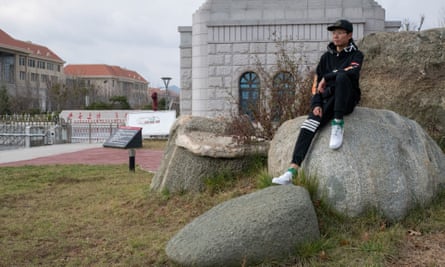
On his 16th birthday, Yuan was looking forward to the independence that would come with adulthood. Living in the city of Hangzhou, his main focus was school, and his dream was to study computer science at the prestigious Zhejiang University in his hometown.
On 28 October, I celebrated my 20th birthday with my roommates in the dorm at Shandong University, in north China. They bought me a tiramisu-flavoured cake and sang. My parents sent me birthday wishes on WeChat, telling me to stay happy every day and study hard. I was happy.
Because of the pandemic, I’d been taking online classes at home in Hangzhou, since the spring festival in late January through to September. It was a new way to study, and I had a hard time getting used to it. This year, I spent the spring festival at home with my parents, instead of with groups of other family members, but it wasn’t too bad. I’m the only child, and because I study in another province now, they were happy I was home.
From January to April, we left the building only a few times: the local government suggested we go out only when necessary. But once the virus was under control in Hangzhou, I went out to take a walk by the West Lake: I remember it was very quiet outside, with few people. Now I’m back at school, taking classes face-to-face. Students are required to wear masks, but I’m OK with that.
At Shandong University, the students come from all over the country and I’m able to meet lots of different people. I once tried chilli sauce from Guizhou province, brought by a classmate from his hometown, and realised the great difference in taste between people in north and south China.

The three years of senior high school were basically all about learning. At university, there are many ways to improve yourself: you can join a club or the student union. I think it’s quite important to make friends; when you need help, you know who to turn to.
At 16, I was more irrational; now I think more before acting. I haven’t been in a relationship yet; I just want to make friends with other students. My parents don’t push me about that.
I originally wanted to do my degree at the Zhejiang University but didn’t get in – something that really disappointed me at first. I’d now like to go there to do a master’s in IT-related studies. Then I will stay in Hangzhou, where there are lots of jobs, and would like to find somewhere close to my parents to live. I hope I can have a bright future.
Interview by Lillian Yang
